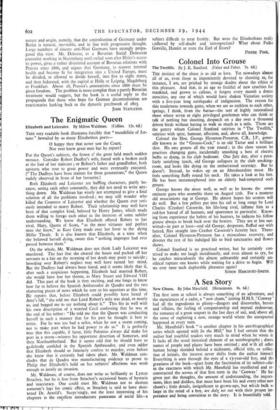The Enigmatic Queen
Elizabeth and Leicester. By Milton Waldman. (Collins. 12s. 6d.) Tun very readable book illustrates forcibly that " mutabilitie of for- tune ".bewailed by so many Elizabethan poets-
0 happy they that never saw the Court, Nor ever knew great men but by report!
For the Queen's subjects, the frown o' the great held much sudden menace. Consider Robert Dudley's wife, found with a broken neck at the foot of her staircase ; or Robert's father and grandfather, both upstarts who rose to great power and were eventually executed. (" The Dudleys have been traitors for three generations," the Queen rudely observed in front of her favourite.) Both Elizabeth and Leicester are baffling characters, riardy be- cause, seeing each other constantly, they did not need to write any- thing down. Mr. Waldman has wisely not attempted to give a final solution of all the problems involved ; we may still wonder who killed the Countess of Leicester and whether the Queen ever seri- ously intended to marry Robert. Their relationship may well have been of that complex kind, beloved by Henry James, which made them willing to forego each other in the interests of some subtler understanding. We know that Elizabeth offered Robert to her rival, Mary, Queen of Scots, "as the most virtuous and perfect man she knew," as Kate Croy made over her lover to the dying Millie Theale. It is also known that Elizabeth, at a time when she believed herself dying, swore that "nothing improper had ever passed between them."
On the whole, Mr. Waldman does not think Lady Leicester was murdered. The fact that she cleared the house and packed off her servants to a fair on the morning of her death may point to suicide ; brooding over Robert's neglect may well have turned her mind. But the Dudleys had always been hated, and it seems likely that if, after such a suspicious happening, Elizabeth had married Robert, she would have lost her throne, as Mary Stuart and Edward VIII did. This part of the book is ikry exciting, and one longs to know how far to believe the Spanish Ambassador de Quadra and the twb shattering pieces of news which he sent to his superiors at this time. He reports that, before Elizabeth 'could possibly have heard of Amy's fall, "she told me that Lord Robert's wife was dead, or nearly so, and begged me to say nothing about it." This fits in well with his own description of a worried Cecil confessing that he was at the end of his tether: "He told me that the Queen was conducting herself in such a manner that for his part he thought it best to retire. For he was too bad a sailor, when he saw a storm coming, not to make port when he had power to do so." It is perfectly - true that this capable, if fussy, little Polonius always did make for port in a storm—witness his opportune desertion of Somerset, and then Northurnberland. But it seems odd that he should have so guilelessly confided in the Spanish Ambassador, and even odder that Elizabeth should so fatuously confess to murder, even before she knew that it certainly had taken place. Mr. Waldman con- cludes that de Quadra was manufacturing evidence to prove to Philip that Elizabeth's hold on her subjects' affections was weak enough to justify an invasion.
Mr. Waldman, of course, does not write so brilliantly as Lytton Strachey, but he is free from Strachey's occasional bouts of hysteria and inaccuracy. One could .trust Mr. Waldman not to shorten someone's legs for comic effect, as Strachey is said to have shor- tened Dr. Arnold's. Surprisingly, not the least interesting of his chapters is the extellent introductory panorama of social life—a
subject difficult to treat freshly. But were the Elizabethans really t.nflawed by self-doubt and introspection? What about Fulke Greville, Hamlet or even the Earl of Essex?
PHCEBE POOL


























 Previous page
Previous page